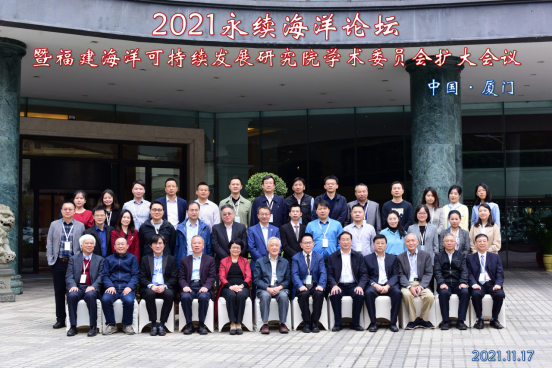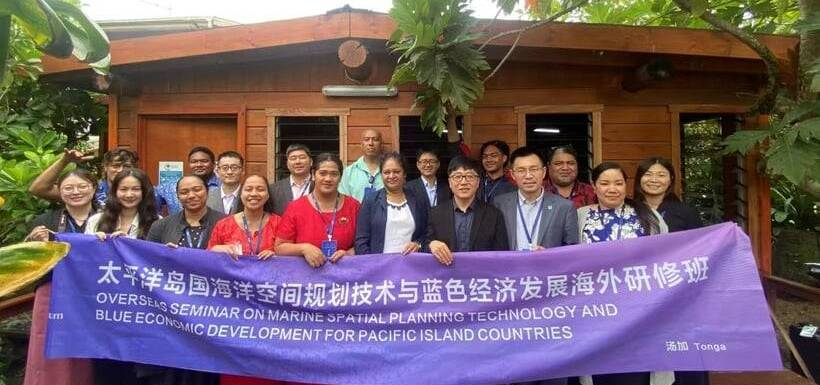News
On November 17, 2021, the 2021 Ocean Sustainability Forum (hereinafter referred to as “the Forum”) co-sponsored by Xiamen University, China Oceanic Development Foundation (hereinafter referred to as “the Foundation”) and Fujian Provincial Department of Ocean and Fisheries was held in Xiamen. The opening ceremony of the Forum was hosted by Xue Xiongzhi, Dean of Fujian Institute of Marine Sustainable Development (Xiamen University). Pan Xinchun (Vice-president and Secretary General of the Foundation), Jiang Hequan (Grade II Counsel of Fujian Provincial Department of Ocean and Fisheries) and Zhang Jianlin (Assistant to the President of Xiamen University) attended the opening ceremony and delivered speeches respectively.
The Forum mainly covers two topics, namely "Carbon Neutrality and Sustainable Coastal Development" and "Exchange Experience on Marine Think Tank Construction ". In the morning, Lu Yonglong (Professor of Xiamen University and Deputy Director of the Academic Committee of Fujian Institute of Marine Sustainable Development), hosted the seminar on “Carbon Neutrality and Sustainable Coastal Development". Dai Minhan (Academician of the Chinese Academy of Sciences and Chief Scientist of Fujian Institute of Marine Sustainable Development), Lin Boqiang (Dean of China Institute for Studies in Energy Policy, Xiamen University), Zhai Yongping (Senior Consultant and Representative of Tencent's Strategic Development Department), Guo Jiaofeng (Assistant Director of the Institute of Resources and Environmental Policy, Development Research Center of the State Council), Liang Xi (Professor of University College London) and Professor Lu Yonglong respectively delivered wonderful speeches on such themes as "Carbon Neutrality and Marine Carbon Sink", "High-quality Growth of China's Economy in the Context of Carbon Neutrality", "Digital Application Prospect of Low-carbon Transition and Tencent's Carbon Neutral Strategy”, "Realizing the Strategic Goals of Carbon Dioxide Peaking and Carbon Neutrality in the New Development Stage is Not Just a Matter of Carbon Itself" and "Establishing Prospective Trading Standards for Marine Carbon Sink”.
Su Jilan (Academician of the Chinese Academy of Sciences and Researcher of the Second Institute of Oceanology, MNR), Hong Huasheng (Professor and Honorary Director of the State Key Laboratory of Offshore Marine Environmental Science of Xiamen University) and other industry celebrities attended the forum. In addition, more than 1,000 experts and scholars in the marine field gathered online.
 Group photo of partial attendees
Group photo of partial attendees
In his speech delivered at the opening ceremony, Mr. Pan Xinchun first welcomed the academicians, leaders, guests and representatives attending the Forum on behalf of the Foundation, one of the sponsors of the Forum. He said that, ocean is the home of human beings, and the sustainable development of marine, including coastal zone, is the eternal theme considered and researched by human beings. However, during the past 200 years since the beginning of the era of industrialization, human beings have continuously discharged excessive pollutants into the ocean, resulting in frequent disasters such as ocean acidification, water pollution, marine microplastic pollution, green tide, and red tide. Continuous and excessive land reclamation activities have caused a sharp decrease of the area and loss of functions of ecosystems on coastal coral reefs, mangroves, seagrass beds, etc.; Continuous and excessive marine fishing and other activities have given rise to the depletion of marine fishery resources; Continuous and excessive emission of greenhouse gases has resulted in global warming, sea level rising, and upsurge in extreme weather. All these have become global issues threatening the survival and sustainable development of human beings.
And he also said that, the UN adopted the 2030 Agenda for Sustainable Development in 2015, which sets out 17 sustainable development goals, requiring human beings to regulate their behaviors and be friendly to the ocean, the home to us all. The Chinese government attaches great importance to the UN 2030 Agenda for Sustainable Development and has made sustainable development a national strategy and introduced a series of policies and measures. In terms of the development of marine economy and promotion of marine sustainable development, the Chinese government has launched many incentive policies such as resource conservation, extension to the high seas, industrial transformation, business mode optimization, tech-drive, innovation orientation and digital empowerment; In terms of the protection of the marine ecological environment and promotion of marine sustainable development, China has formulated a series of tough regulatory measures such as strictly controlling land reclamation, protecting natural shorelines and coastal wetlands, strengthening marine ecological restoration, controlling the total amount of pollutants discharged into the sea, and limiting the fishing intensity. In terms of the reduction of carbon emissions and promotion of sustainable development, China has adopted the Action Plan for Carbon Dioxide Peaking Before 2030, which determines ten actions to achieve carbon dioxide peaking and carbon neutrality, and incorporates carbon dioxide peaking and carbon neutrality into the overall economic and social development of China, with a view to accelerating the green revolution in the way we work and live, and promoting economic and social development based on efficient resource use and green and low-carbon development.
He emphasized that, the key to the realization of marine sustainable development and carbon dioxide peaking and carbon neutrality in China lies in the concerted efforts and firm implementation of all walks of life across the country. He hoped that the experts and scholars present here would take the lead in promoting carbon neutrality and marine sustainable development, and actively become practitioners, propagators and demonstrators in this regard.
He suggested that we should, while doing our own work, attach importance or pay attention to the following issues: First, attach importance or pay attention to the research on marine carbon sink, including researches on the carbon sequestration mechanism and carbon sink capacity of marine ecosystems (such as mangroves, seagrass beds, salt marshes and algae), the evaluation standard system for marine carbon sink technology, and the policies, systems and mechanisms for and capacity building regarding marine carbon sink. Second, attach importance or pay attention to the construction of marine ecological early warning and monitoring system, including finding out the actual situations of marine ecology in China, constructing the classification and zoning framework for marine ecology, conducting offshore ecological trend monitoring, establishing marine ecological early warning system, and implementing polar deep-sea ecological monitoring; Third, attach importance or pay attention to territorial space planning, including the division of functions in territorial space planning for the comprehensive protection and utilization of the marine sector and coastal zone, overall land-sea planning, shoreline protection, industrial layout, ecological construction and human-sea harmony; Fourth, attach importance or pay attention to the United Nations “Decade of Marine Science for Sustainable Development”, including finding out the basic situations of marine resources and ecological environment, and conducting researches on marine natural laws and the carrying capacity of marine resources and environment, and on ecosystem-based integrated marine management system and marine economic development; Fifth, attach importance or pay attention to the Maritime Silk Road Project of "Promoting Marine Spatial Planning to Contribute to the Development of Blue Economy". According to Pan Xinchun, the Maritime Silk Road Project is a major project established, funded, organized and implemented by the Foundation to promote the “Belt and Road” Initiative, build a blue partnership, and introduce China's solutions for ocean governance. And the main contents thereof include preparing marine space planning, formulating marine management systems, training marine management personnel, establishing marine information systems, conducting marine-related researches and marine public service, and introducing or organizing enterprises to invest and start businesses for countries along the Maritime Silk Road and small island countries. Since 2018, the Foundation has signed cooperation agreements on the Maritime Silk Road Project with 18 countries along the Maritime Silk Road and one international organization (Pacific Islands Development Forum), with relevant work progressing as planned.
Mr. Pan Xinchun stressed that carbon neutrality and marine sustainable development (including coastal zone) are closely related to all of us. If we human beings resolve to address these major global issues caused by our own misbehaviors, we need to care about ourselves, treat the earth well, protect the ocean, change our way of production and life, and actively participate in the practice of carbon neutrality and marine sustainable development, fulfill our missions, contribute our wisdom and talents, live up to the times and the prime of youth , strive to be true heroes in the new era, and strive for the great rejuvenation of the Chinese Nation.
In the afternoon, Pan Xinchun presided over the special seminar of “Exchange Experience on Marine Think Tank Construction". Professor Xue Xiongzhi, Academician Su Jilan, Academician Dai Minhan, Zhang Haiwen (Director of China Institute for Marine Affairs, Ministry of Natural Resources), Pan Xinchun and Deng Yingying (Researcher of Hainan Tropical Ocean University) introduced their experience in think tank construction, and all experts and scholars present at the seminar expressed their opinions and suggestions on marine think tank construction freely.
In conclusion, Pan Xinchun further emphasized that, the ocean is related to the survival of human beings, the sustainable development of our economy and society, and also the great rejuvenation of the Chinese Nation. And the construction of marine think tank in China still has a long way to go. Marine think tank shall be responsible, prospective and resourceful enough to become an important support for scientific and democratic decision-making by the Party and the government, an important contributor to the modernization of national governance system and governance capacity, and an important part of national soft power and discourse power.

- Marine Spatial Planning Study Tour 2023 Officially Launched
- President Lv Bin Met with Her Royal Highness of Tonga Pilolevu Tuita in Beijing and Signed a Memorandum of Understanding on Cooperation
- Dialogue eyes key role of youth in RCEP region's growth
- Pan Xinchun Attends the 2022 China Ocean Action Roundtable and Introduces Ten Major Actions



 Home
Home  About Us
About Us  Our Programs
Our Programs  Cooperative Partner
Cooperative Partner